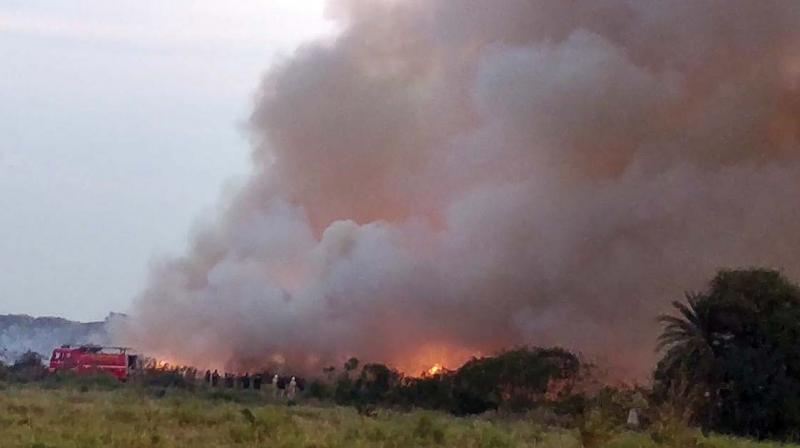Bengaluru: The Bellandur inferno
By evening, smoke billowing from lake engulfed Koramangla.

Bengaluru: Bengaluru's largest lake combusted and exploded at around noon on Friday emitting smoke and fire for almost seven hours, with attempts to douse it failing as fresh fires were reported again at two separate places after sundown, with the unending stream of toxic smoke billowing into homes and apartments surrounding the lake as well as into the upmarket residential and commercial neighbourhood of Koramangla till late into the night.
"There was ash all over my garden," said one shocked resident, adding "it was getting difficult to breathe, " setting off fears for the health of the young and the elderly.
Officials from the Bangalore Development Authority which is tasked with keeping the city's 262 lakes and tanks clean had no answer on why Bellandur had combusted, although city activists and conservationists say that despite all the talk, the task of policing the flow of untreated sewage into the lake was a major challenge. The release of methane could be one of the reasons for the fire on water, said experts.
Bellandur alone receives around 40 per cent of the city's sewage. Some 1,280 million litres of sewage is generated in this city of 1.2 crores, with the city's infrastructure having the capacity to handle only 721 million litres of sewage.
Officials of the Karnataka Lake Development Authority (KLCDA) said that the fires could have also been the handiwork of grass harvesters who set fire to the weeds that have take root in the sewage-filled lake, which they use as fodder to feed their cattle.
5,000 armymen sweat it out
More than 5,000 army personnel along with the officials of Karnataka Lake Development Authority (KLCDA) were deployed to douse by far the biggest fire of the three fires that have raged at Bellandur lake.
The army came to the rescue as they were the first top notice the smoke which engulfed the army firing range premises.
CEO of KLCDA Seema Garg maintained that the grass growing on and in the lake which had been set on fire by grass harvesters was the reason behind the fire. “It would be appropriate to have few guards on duty to prevent the grass harvesters from setting fire intentionally to the grass. They want to get the fresh flush of grass for cattle.”

